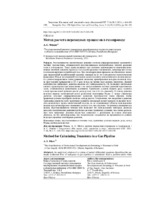Метод расчета переходных процессов в газопроводе
Another Title
Method for Calculating Transients in a Gas Pipeline
Bibliographic entry
Фиков, А. С. Метод расчета переходных процессов в газопроводе = Method for Calculating Transients in a Gas Pipeline / А. С. Фиков // Энергетика. Известия высших учебных заведений и энергетических объединений СНГ. – 2021. – № 5. – С. 446-458.
Abstract
Рассматривается аналитическое решение системы дифференциальных уравнений в частных производных, описывающей неустановившееся изотермическое течение реальных газов в газопроводах. Такая задача возникает при изучении закономерности изменения мгновенных значений давления и расхода газа в магистральных газопроводах, например при пусках и остановках крупных потребителей газа. При этом переходные процессы не обязательно имеют ярко выраженный колебательный характер, невзирая на то что описываются периодическими функциями. В ходе исследований поставлена задача получить математическую модель процесса с учетом инерционного члена уравнения движения, пренебрежение которым возможно только при условии превышения в 3,5–4 раза потерь на трение над ударным давлением. Важной особенностью найденного решения является его универсальность, что позволяет значительно снизить трудозатраты при нахождении с его использованием частных решений практических задач, отличающихся граничными условиями. Граничные условия первого рода задаются в виде произвольной функции как по расходу газа, так и по его давлению. В основу решения положен широко применяемый метод разделения переменных Фурье. С целью упрощения расчетов исходное дифференциальное уравнение преобразуется таким образом, чтобы граничные условия приобрели свойство однородности. Установлено, что введенные в решение требования равенства нулю граничных условий в начальный момент времени позволяют получить компактную запись аналитической модели, но не ограничивают область использования модели при скачкообразном изменении расхода газа или давления. Полученная аналитическая модель неустановившегося течения газа позволяет без использования интеграла Дюамеля находить аналитические решения при более сложных граничных условиях, чем скачок расхода. При этом найденные решения полностью совпадают с решениями на основе интеграла Дюамеля, но без интегрирования, что положительно сказывается на применимости данного подхода в практике инженерных расчетов.
Abstract in another language
An analytical solution of a system of partial differential equations describing the unsteady isothermal flow of real gases in gas pipelines is considered. Such a problem arises when studying the regularity of alterations in the instantaneous values of pressure and gas flow in main gas pipelines, for example, during startups and shutdowns of large gas consumers. Meanwhile, transients are not necessarily of a pronounced oscillatory nature, despite the fact that they are described by periodic functions. In the course of the research, the task was set to obtain a mathematical model of the process taking into account the inertial term of the equation of motion, the neglect of which is possible only if the friction losses are exceeded by 3.5–4 times over the shock pressure. An important feature of the solution that have been found is its universality, which makes it possible to significantly reduce labor costs when using it to find partial solutions to practical problems that differ in boundary conditions. The boundary conditions of the first kind are given as an arbitrary function of both the gas flow rate and its pressure. The solution is based on the widely used method of separation of Fourier variables. In order to simplify the calculations, the original differential equation is transformed in such a way that the boundary conditions acquire the property of homogeneity. It has been determined that the requirements that the boundary conditions are equal to zero at the initial moment of time introduced into the solution make it possible to obtain a concise record of the obtained analytical model, but do not limit the area of the use of the model with a surge change in the gas flow rate or pressure. The obtained analytical model of unsteady gas flow makes it possible, without using the Duhamel integral, to find analytical solutions under more complex boundary conditions than the flow rate jump. At the same time, the solutions found completely coincide with the solutions based on the Duhamel integral, but in the course of the solution that we have found it is possible to avoid integration, which has a positive effect on the applicability of this approach in the practice of engineering calculations.
View/
Collections
- № 5[7]

